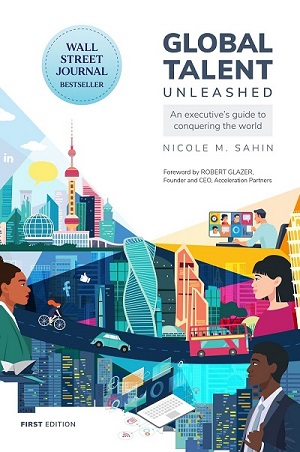The dedication at the beginning of Nicole M. Sahin’s new book should say it all. “This book is dedicated to everyone who devotes their own work to harnessing the talents of everyone, everywhere—for the betterment of us all. To our customers, our partners, and my Dream Team—your work, passion, and ingenuity inspire me!” she christens at the beginning of Global Talent Unleashed: An Executive’s Guide to Conquering the World. As far as Sahin is concerned, her interest in the titular concept of workplace globalization isn’t just a result of practical changes in the postmodernist workplace, but also because of its worldly implications. “Globalization Partners exists, in part, because of my love of and appreciation for global travel, which was sparked during college.
ABOUT THE PROJECT: https://www.globalization-partners.com/
A series of opportunities to leave my hometown of St. Louis and travel to countries I had barely heard of was only possible thanks to my mom,” she writes at the beginning. It’s a nice touch that immediately familiarizes us to Ms. Sahin, making the more heady and statistical aspects of the read and its topicality much more compelling because of said familiarity. What she writes about in and of itself, however, is a fascinating phenomenon to track. More and more, jumpstarted by regulations of the Covid-19 pandemic, employee bases are going remote in increasingly innovative fashion.
While initially bemoaned as problematic to certain workplace environments, Sahin brilliantly demonstrates the positive implications of such a shift. Primarily the opportunity for a company’s workforce to become globalized, expanding the opportunities for employment and industrial innovation beneficially. Also, not to mention, to address systemic problems related to company policy in a pre-pandemic world. In essence, in the best case of all affiliated scenarios, Sahin states many people can come out swinging…
“The biggest enabler of the recent international push has been the growing acceptance of remote work. With a declining reliance on face-to-face, in-person meetings and an increasing comfort level with supervision from afar, location has become less essential, or perhaps less relevant,” she writes. “…Although, historically, setting up a new operation in another country has been complex and involved, there is a new way that offers organizations a shortcut to doing business internationally: the Employer of Record model, which I launched almost 10 years ago…” She continues, “…Now that remote work is possible almost across the board, more companies are exploring the ramifications of that new capability.
AMAZON: https://www.amazon.com/Global-Talent-Unleashed-Executives-Conquering-ebook/dp/B09KMF8T53
We’re seeing many companies choose lower-cost international locations when they can—for example, Boston-headquartered companies are looking at St. Louis, and San Francisco has seen an exodus to Texas. North American–headquartered companies also hire in Toronto, Mexico, and Central/South America.”
It’s the kind of casual, matter-of-fact tonality that drew me into the nature of the read viscerally. What Sahin talks about as a result of this feels that much more exciting and alluring. As a young professional climbing the rungs of the postmodernist corporate ladder, hearing from the experts about the increasing amorphous, fluid, and shifting echelons of power in the workforce space is a breath of fresh air. It reminds me that in this semi-experimental time anything can be, in fact, possible…
Cyrus Rhodes



























